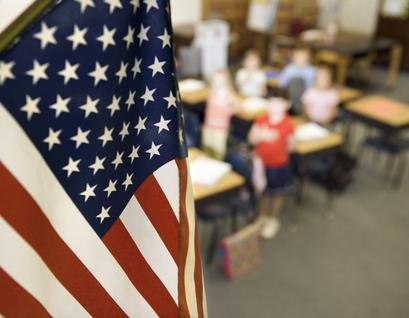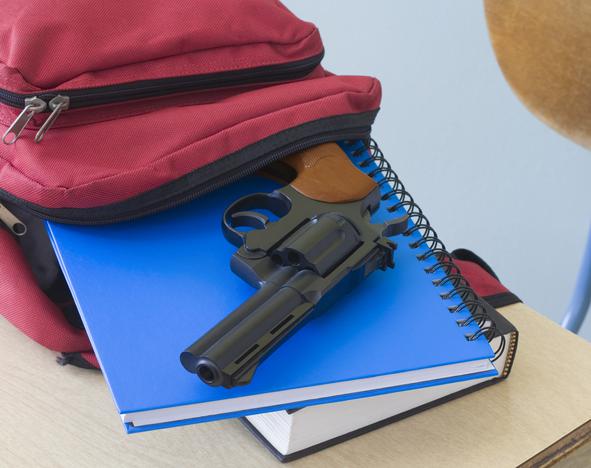Rise Up Review
When Wind Snaps Flagpoles
I’d never walked into a classroom after a school shooting before.
No, that’s not right.
I was eleven when Columbine happened, but my Midwestern mom and my Catholic school teachers hid things pretty well.
And when 9/11 came, my teacher walked into religion class, switched on the TV, and left. I was sitting on my desk with my feet on my chair when the first tower got hit. I put my hand over my mouth and kept it there.
This is my first year teaching. I’m an adjunct humanities professor, and I teach a dual credit college course. That means I have the honor of teaching three phenomenal adults, and 28 of the most talented high school students in rural Texas. We just finished a lesson on Romantic poetry, where we read lines like this:
And even the motion of our human blood
Almost suspended, we are laid asleep
In body, and become a living soul:
While with an eye made quiet by the power
Of harmony, and the deep power of joy,
We see into the life of things.
The students tore into Wordsworth with such exquisite enthusiasm. I said I wasn’t sure how to interpret “the sad still music of humanity,” and they said, “Still! It’s still sad! He’s wondering when it will stop being sad!” They had it. My interpretation was falling flat because I couldn’t bring proper meaning to “still.” The music is fixed, static, so what? “So it needs to change!” they cried. I’d forgotten the desperate, bucking energy of being seventeen. I’d forgotten what it feels like to be so, wholly, overtakingly ready. It’s a vibration, a frequency. The world isn’t moving or changing fast enough to match you, and it’s maddening. Part of me believes, with absolute certainty, that Wordsworth wrote this line for them.
On the day after the school shooting in Parkland, Florida, I walked into the classroom unsure of my footing. Is this the kind of thing we talk about? I have an improvisational theater background; I’m trained in harnessing what’s in the room and using it to build something. There was energy in this room. The students were fidgety. Their heads were bowed, their arms were crossed like they were protecting something. So when we finished the material 20 minutes early that Wednesday, I had a decision to make. Let them go early, or find a way to build something from the crossed arms, and the fidgets. Without knowing exactly what I was doing, I said, “So we’ve got twenty minutes. Do you want to talk about the shooting? You don’t have to, but if you want to, we can.”
Maria, a dancer, who writes analytical essays on dance routines set to songs that criticize bullying, said, “I feel like the teachers don’t want us to.”
“Don’t want you to what?”
“To talk about it,” Maria said.
“Do you want to talk about it?”
Evy raised her hand and said, “Why do they think we’re coming for your guns? No one’s coming for your guns.”
And Jonathan said, “You think if we ban guns that some guy’s not going to get a gun?” “I’m not saying ban all guns,” Evy said hotly, and then we were off.
My students spoke like bursting that day. It became immediately clear that my job was to hold space for them. This looked like reflecting back what they said, making sure I understood each point thoroughly, and subtly encouraging them to hold space for each other. And then I noticed Samuel.
Samuel is one of the three adult students in a class of seventeen-year-olds. He’s a veteran, has two kids, and his wife left him last year. He and I have a rapport because he casually mentioned that he likes to write sonnets, and I told him I’d give him extra credit if he brought one to class. He’s turned in a sonnet a week for the last 14 weeks. He caught my eye because he was staring at the floor like it would explode if he looked away.
“Samuel,” I said, “I’d love to hear what you think about this, but I understand if you’re not in a talkative place.” He opened the fist that he’d been holding to his mouth. “Well, professor, I have to say that as a veteran and as a gun owner I am really saddened today.”
“Tell me why your identity as a gun owner and a veteran is important here.”
In that moment, I read him, and he read me; we both knew that he wasn’t answering that question for us. He was answering it for the 28 teenagers in the room.
“I know what it is to take a life. And I know this is controversial, but I don’t think any civilian needs a semiautomatic weapon.”
The air got thin.
“I have a gun collection. I collect antique guns and I keep ‘em in a locked safe,” Samuel said. I smile. “My grandpa did that too.”
He nodded to me, saying, “And I have a gun that I’m trained to use in case anything happens to me and my two boys. But I just don’t think there’s any reason for a civilian to have a semiautomatic rifle.”
Then Samuel turned to face his teenage classmates, and for a moment he was a father. “Look,” he said. “You all are gonna be 18 soon. You’re gonna be adults. You are adults. If you don’t want to buy a gun, that’s fine. And if you want to buy a gun, that’s fine. But be responsible about it.”
Then my students took a page out of the improvisational theater playbook and built something. They raised their heads, uncrossed their arms, and clapped for Samuel. Something in them connected with something in him, and they built the thing with clapping.
It all comes back to stillness. I don’t know exactly what Samuel and my students built with each other that day, but I was witness to the building. If I know anything about these teenagers, it’s their total rejection of the static. The “still.” They’re desperate for entry points into change, and they have such phenomenal power, and the energy to build something with it. They’re looking for a way in. I’m trying hard to give it to them.
My friend lives in Oklahoma. She says the wind blew so hard last week, that it snapped the flagpole in her front yard. When I think about wind strong enough to snap flagpoles, I think of Samuel. And I think of my students.
E. C. Kelly has an M.A. in Liberal Arts, which is a fancy way of saying she's studied teaching, acting, and creative writing a lot. What motivates her writing is the queer kid born to an unaccepting family. She wants to reach that kid.

